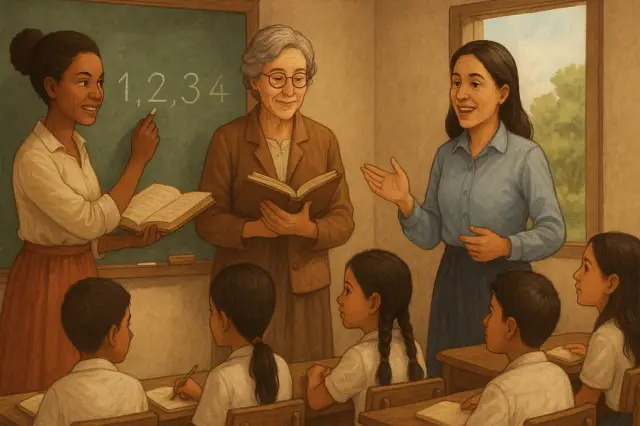Education in Colombia has been shaped by the efforts and vision of women who, throughout different eras, broke barriers and paved the way for future generations. These Colombian women who transformed education left an invaluable legacy that continues to inspire teachers, students, and leaders across the country.
Their influence extends beyond the classroom: it is present in public policy, gender equality, pedagogical innovation, and cultural development. To know their stories is to understand how knowledge and perseverance can change a nation.
Education and female leadership in Colombia
From the late 19th century to the present day, women have conquered spaces in academia and teaching that were previously dominated by men. Through their work, they have ensured that female education ceased to be a privilege and became a right.
In Colombia, the advancement of women's education was neither swift nor easy. For decades, women were relegated to domestic roles and excluded from higher education. However, courageous figures challenged the norms and created institutions, movements, and reforms that transformed the educational landscape.
Today, Colombia has thousands of female teachers and academics who are the foundation of the national education system. Their role has been essential in literacy, inclusion, rural education, and the defense of equality.
Pioneers who paved the way for education
1. Soledad Acosta de Samper (1833–1913)
Writer, journalist, and one of the first advocates for women's access to education. In her 19th-century publications, Acosta de Samper insisted that female education was key to the country's progress.
She founded educational and cultural magazines where she promoted scientific and moral education for Colombian women, anticipating current debates on educational equality.
2. Maria Montessori in Colombia: The Legacy of Georgina Fletcher
Although the Italian educator never visited Colombia, her method was introduced thanks to Georgina Fletcher , one of the main proponents of modern education in the country. Fletcher founded educational institutions inspired by Montessorian thought, focused on child autonomy and practical education.
3. Mercedes Abrego and her formative vision
Although she is remembered as a heroine of the independence movement, Mercedes Abrego also promoted female learning and civic education in her community of Cúcuta. Her influence extended into the 19th century as an example of a woman educator and patriot.
4. Gabriela Mistral and her impact on Colombian teaching
Chilean poet and educator Gabriela Mistral , who lived in Colombia for a time, profoundly influenced national pedagogy. She mentored teachers and left her mark on teacher training in Tunja and Bogotá, highlighting human sensitivity in teaching.
20th-century educators who changed history
5. Clelia Fajardo: the people's literacy teacher
Recognized for her social work, Clelia Fajardo brought literacy programs to rural communities in the 1950s and 1960s. Her work helped reduce illiteracy in marginalized regions and consolidated the role of the rural teacher as an agent of change.
6. Olga Lucía de González and education for peace
Founder of pedagogical movements inspired by coexistence and peaceful conflict resolution, Olga Lucía de González promoted the idea that school should be a space for dialogue. Her approach remains a benchmark in the Ministry of Education's educational programs.
7. Antonia Santos and the teaching of patriotism
Although she was a heroine of the independence movement, Antonia Santos also represents the educational spirit of female leadership. She taught her community the value of knowledge and freedom, transmitting ideals that are practiced today in civic education.
Contemporary educators who continue to transform Colombia
8. Vicky Colbert and the “New School” model
Internationally renowned, Vicky Colbert de Arboleda developed the Escuela Nueva pedagogical model, adopted by more than 20 countries. This system, born in Colombia, revolutionized rural education by adapting it to the needs of each community.
Colbert has received multiple awards, including the WISE Prize for Education (2013), considered the “Nobel” of education.
9. María Emma Mejía and educational diplomacy
As Minister of Education and Colombia's ambassador to the UN, María Emma Mejía promoted gender equity policies, academic innovation, and higher education access programs. Her comprehensive approach has modernized Colombia's approach to education.
10. Cecilia María Vélez White: modernization of the educational system
During her tenure as Minister of Education, Cecilia María Vélez White spearheaded one of the most far-reaching reforms in recent times. She promoted the National Assessment System and educational coverage programs that benefited millions of students.
The current role of women in Colombian education
Currently, more than 70% of Colombia's teaching staff are women , according to data from the Ministry of Education. They don't just teach: they lead institutions, design curricula, conduct research, and transform entire communities.
Female leadership in education has enabled the creation of projects focused on innovation, sustainability, inclusion, and science. Thanks to them, Colombian education is more equitable and diverse.
The legacy that inspires new generations
Each of these women represents a story of achievement, intelligence, and social commitment. Their contributions demonstrate that change in education is not only happening in large ministries, but also in rural classrooms, libraries, universities, and homes.
Remembering her legacy is a way to recognize that education is an act of courage , especially when it challenges social and cultural limitations. Today, many young Colombian women follow her example by choosing education as a way to transform their environment.
Women and education: a story that continues to be written
The impact of women on Colombian education continues unabated. New generations of teachers, principals, pedagogues, and researchers continue to strengthen training processes, incorporating technology, inclusion, and sustainability as pillars of 21st-century learning.
History shows that when a woman teaches, she not only transmits knowledge: she transforms lives and builds a country .
